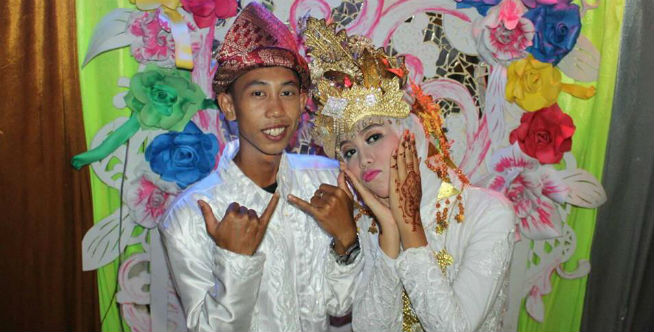At long last, legal efforts by activists pushing for an increase to the legal age at which women can get married in Indonesia have paid off.
On Thursday, the Constitutional Court (MK) granted part of a judicial review of the 1974 Law on Marriage, ruling that the law as it currently stands discriminates against women. The law currently stipulates that the legal minimum age for marriage in 16 for women and 19 year old for men.
In the decision, read by Chief Justice of MK Anwar Usman, the court agreed with the petition, which argued that the difference in minimum ages for men and women constituted a form of discrimination. The court also considered the current regulation to be contrary to the country’s Child Protection Act, which defines children as those under the age of 18.
“The age limit, which is stipulated in the Law on Marriage still includes those categorized as children,” Judge I Dewa Gede Palguna said, as quoted by CNN Indonesia.
Judge Palguna said the court agreed that child marriage has many negative effects on girls, especially in regards to their health and education, as well as putting them at greater risk of exploitation and threats of violence. He also noted that the age limit of 19 year old for men means they have a longer period under which they can benefit from the legal protections of being classified as a child than women.
He then referred to the provisions stated in Article 31 of the 1945 Constitution, which says every Indonesian citizen has the right to receive 12 years of basic education, and argued that a women getting married at the age of 16 almost always leads to them ending their education prematurely.
“The right to education is a constitutional right, it should be enjoyed equally between men and women,” Palguna added.
Despite being a major legal victory for activists seeking to end child marriage in Indonesia, the decision is somewhat limited. In its decision, the Constitutional Court said it did not have the authority to decide upon the age limit or revise the laws, so their ruling states that the DPR (House of Representatives) must change the law within the next three years.
An attorney representing the petitioners, Anggara, said the court’s decision should demonstrate that problem child marriage really is at emergency levels in Indonesia and should provide the impetus for President Joko Widodo to issue a Perppu (Government Regulation in lieu of Law).
“MK’s decision creates a constitutional reason for the president to declare that there is an urgency that forced them to grant the appeal. The president should issue a Perppu,” Anggara said on Thursday, as quoted by Kompas.com.
The Constitutional Court actually rejected a previous appeal to increase the minimum age of marriage for women, from 16 to 18 y.o in 2015. At that time, the court stated that there was no guarantee that increasing the age limit would reduce divorce, health, or social problems.
In April, President Joko Widodo actually said that he would willing to sign a Perppu to end child marriage, however conservative religious groups, including the Indonesian Ulema Council (MUI) voiced their objections, arguing that it would violate religious freedoms. The government then said it would continue to discuss the matter, taking into consideration those objections, but until now there have been no updates.
Even if the DPR revises the marriage law in line with the court’s order, it may not be enough to put an end to child marriage as the law also includes a religion-based legal loophole that has been used to allow underage girls and boys to be married through the practice of customary, religiously sanctified marriages known as “nikah siri”.
The practice, which has allowed children as young as 14 to get married, can still be considered legal if it is done “in accordance” with religious beliefs. As such, underage marriages that have been sanctified by religious courts or officials must still be officially recognized by the government.
While conservative Islamic organizations such as MUI have argued that the 1974 Marriage Law is necessary to uphold the first tenet of Pancasila (Indonesia’s state ideology), which upholds the supremacy of religion, other religious groups disagree. In April of last year Indonesian female Muslim clerics issued an unprecedented fatwa (edict) declaring child marriage to be harmful as it is a large contributor to Indonesia’s high maternal mortality rate.
Women’s Empowerment and Child Protection Deputy Minister Lenny Rosalin echoed the sentiments of many when she said that child marriage in Indonesia is at “emergency levels”. She based her statement on UNICEF data that shows that Indonesia ranks seventh in the world and the second highest in Southeast Asia in terms of the overall percentage of marriages in which at least one of the spouses is under 18 years old.
According to government census data, 17% of all Indonesian girls married in 2016 were under 18.





Reader Interactions